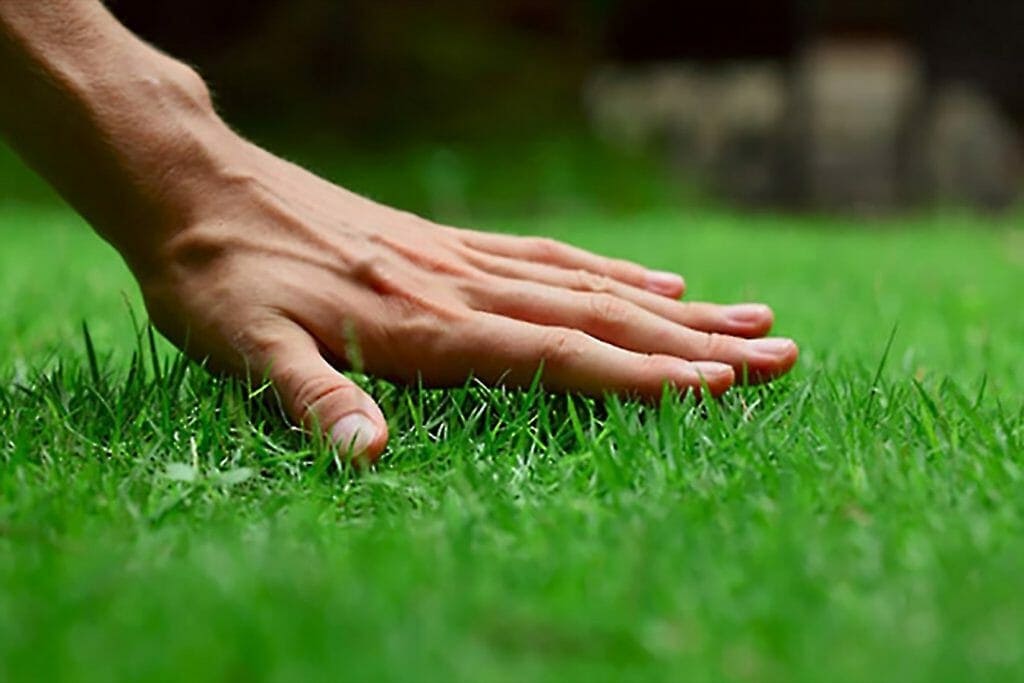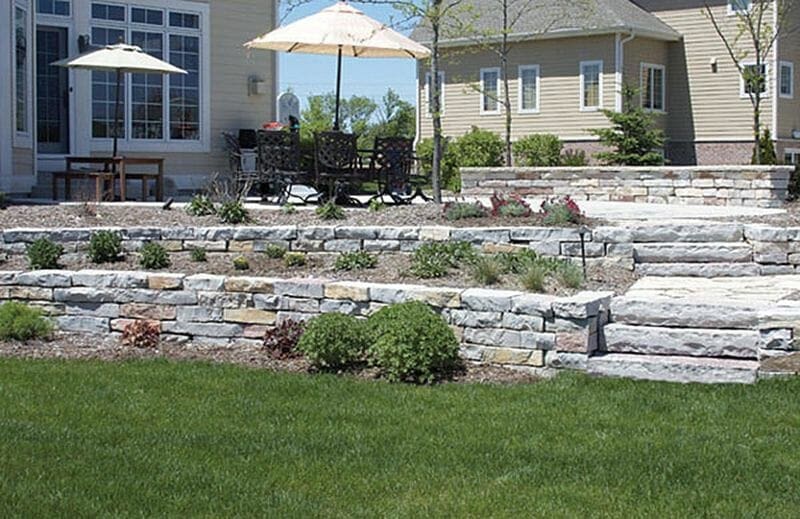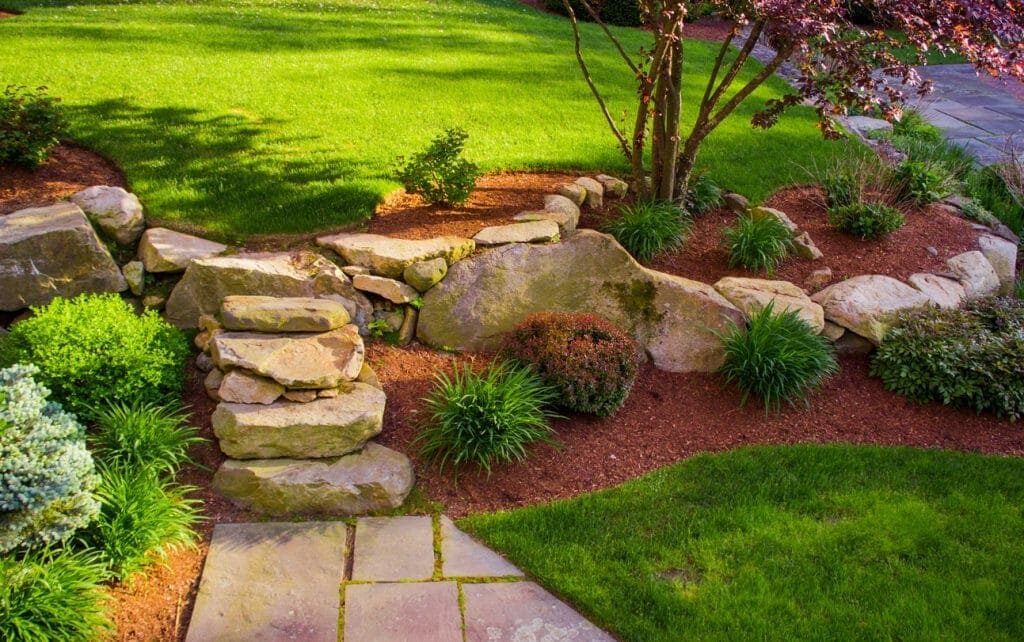Written by Admin and published on https://www.loveyourlandscape.org/.
It’s a little bit amusing the sheer number of people who forget that landscaping is important all the time; not just when you decide you want to list your house for sale. The art of landscaping is a precious one. Not only does lovely landscaping improve the overall appearance of your home, but it also helps to increase the value of your home, but we all know these things. Everyone talks about curb appeal and the added value careful landscaping adds to a home, but no one ever discusses the more intricate reasons to hire a great landscape design firm. Well, we’re going to tell you that there are reasons far outside the box that require great landscaping, and they have everything to do with how you feel as a person. Pretty in-depth and deep, right? We aren’t doctors or psychiatrists, by any means, but we firmly believe that the way your yard looks reflects how you feel about your home on the inside, and how you feel in general. Read on to find out a few of the biggest reasons we think that your yard deserves a bit more of your time and attention.
The Benefits of Landscapes
Lush green grass tickles our toes … flowers treat our eyes to bold, vibrant colors … and fragrant shrubs delight us with their sweet perfumes. It’s easy to appreciate the sights and smells afforded by lawns and landscapes, but did you know their real value is much more substantial than pleasing aesthetics and aromas? That’s right, well-managed landscapes offer tremendous benefits for people and for the environment. Let’s explore some of the little understood, but vitally significant, benefits of landscapes.
Environmental Benefits of Managed Landscapes
- Natural Coolants – Grass is much cooler than asphalt or cement. It acts as an “air conditioner” for the surrounding area. In fact, lawns can be 31 degrees cooler than asphalt and 20 degrees cooler than bare soil. But wait, there’s more. Trees shading homes can reduce attic temperatures by as much as 40 degrees.
- Environmental Cleaners – Grass plays a vital role in capturing dust, smoke particles and other pollutants, and it produces oxygen.
- Water Protectors – Healthy lawns absorb unhealthy runoff that might otherwise filter into bodies of water
- Air Cleaners – Grasses absorb carbon dioxide and break it down into oxygen and carbon. In fact, a 50’x50′ lawn produces enough oxygen for a family of four.
- Noise Minimizers – Lawns and plants dramatically reduce noise pollution; they can reduce noise levels by 20 percent to 30 percent over hard surfaces like concrete and pavement.
- Turfgrass slows down and absorbs runoff into bodies of water.
-
Even in areas that have water restrictions and are experiencing drought, it is important that lawns and landscapes remain a viable component of healthy communities. There are a number of sustainable practices that will allow managed lawns and landscapes to reduce water usage but still provide important environmental benefits.
Benefits of Urban Landscapes
A growing body of research is demonstrating how important it is to incorporate tree canopies and parks into cities and towns. They provide a wide range of lifestyle benefits that improve the quality of life for residents.
- Parks and tree canopies help reduce noise.
- A recent study by the U.S. Forest Service found that neighborhoods with tree-lined streets and larger yard trees have reduced crime rates.
- Studies show that just looking at plants and trees, even through a window, can reduce stress and lower blood pressure (Housley and Wolf).
- Walking in a natural environment with plants and trees, even when located in the middle of a city, has been shown to improve attention and memory, according to a study by Marc Berman of the University of Michigan.
- Neighborhoods that incorporate community green spaces have lower incidences of stress, have lower health care costs, and have an improved quality of life (Housley and Wolf).
Benefits of Commercial Landscapes
Businesses are more successful when they provide clients with landscaped areas around buildings and plants inside buildings.
- A study found seven percent higher rental rates for commercial offices having high-quality landscapes*.
- Shoppers claim they will spend nine to 12 percent more for goods and services in central business districts that have high-quality tree canopies.*
- Shoppers indicate they will travel a greater distance and a longer time to visit a district with a high-quality tree canopy and spend more time there once they arrive.*
- Companies that provide their employees with interactions with nature also benefit. Research conducted by Rachael Kaplan, Ph.D., showed that workers who could view nature from their desks had a much better job and life satisfaction and better health.
*The University of Washington’s Urban Forestry/Urban Greening Research
Physical and Psychological Benefits
The benefits of human interaction with plants, trees, and grass are also well studied and documented. Research has found that people find stress relief and healing when interacting with nature or even viewing it through a window. Children with ADHD seem to focus better after being outdoors (Harvard Health Publications). Workers are more productive as well when working in environments with plants, and cognitive function is improved.
But, perhaps more important than what science tells us, is what people instinctively feel about the plants and green spaces in their lives–that the connection makes their lives better, and they want to make an effort to incorporate it into their lives.
Research from the Husqvarna Global Garden Report 2012 showed that “63% of respondents reported being willing to pay more for an apartment or house if it was located in an area with good green spaces, compared with, for instance, 34% willing to pay more for an area with good shopping and 33% for good cultural venues.”
Resources
There are many organizations researching and documenting the effect of plants and green spaces on the environment and on our lives including:
- The University of Washington, Center for Urban Forestry
- Nature Sacred
- Project Evergreen
- Green Plants for Green Buildings
- American Society of Landscape Architects
- The Lawn Institute
- Nebraska Agricultural Extension Station Research Bulletin
- Department of Interior
- National Park Service
Original post here https://www.loveyourlandscape.org/benefits/the-benefits-of-landscapes/.



